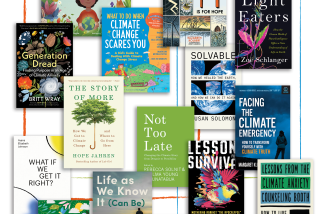If only gay sex caused global warming
- Share via
NO ONE seems to care about the upcoming attack on the World Trade Center site. Why? Because it won’t involve villains with box cutters. Instead, it will involve melting ice sheets that swell the oceans and turn that particular block of lower Manhattan into an aquarium.
The odds of this happening in the next few decades are better than the odds that a disgruntled Saudi will sneak onto an airplane and detonate a shoe bomb. And yet our government will spend billions of dollars this year to prevent global terrorism and ... well, essentially nothing to prevent global warming.
Why are we less worried about the more likely disaster? Because the human brain evolved to respond to threats that have four features -- features that terrorism has and that global warming lacks.
First, global warming lacks a mustache. No, really. We are social mammals whose brains are highly specialized for thinking about others. Understanding what others are up to -- what they know and want, what they are doing and planning -- has been so crucial to the survival of our species that our brains have developed an obsession with all things human. We think about people and their intentions; talk about them; look for and remember them.
That’s why we worry more about anthrax (with an annual death toll of roughly zero) than influenza (with an annual death toll of a quarter-million to a half-million people). Influenza is a natural accident, anthrax is an intentional action, and the smallest action captures our attention in a way that the largest accident doesn’t. If two airplanes had been hit by lightning and crashed into a New York skyscraper, few of us would be able to name the date on which it happened.
Global warming isn’t trying to kill us, and that’s a shame. If climate change had been visited on us by a brutal dictator or an evil empire, the war on warming would be this nation’s top priority.
The second reason why global warming doesn’t put our brains on orange alert is that it doesn’t violate our moral sensibilities. It doesn’t cause our blood to boil (at least not figuratively) because it doesn’t force us to entertain thoughts that we find indecent, impious or repulsive. When people feel insulted or disgusted, they generally do something about it, such as whacking each other over the head, or voting. Moral emotions are the brain’s call to action.
Although all human societies have moral rules about food and sex, none has a moral rule about atmospheric chemistry. And so we are outraged about every breach of protocol except Kyoto. Yes, global warming is bad, but it doesn’t make us feel nauseated or angry or disgraced, and thus we don’t feel compelled to rail against it as we do against other momentous threats to our species, such as flag burning. The fact is that if climate change were caused by gay sex, or by the practice of eating kittens, millions of protesters would be massing in the streets.
The third reason why global warming doesn’t trigger our concern is that we see it as a threat to our futures -- not our afternoons. Like all animals, people are quick to respond to clear and present danger, which is why it takes us just a few milliseconds to duck when a wayward baseball comes speeding toward our eyes.
The brain is a beautifully engineered get-out-of-the-way machine that constantly scans the environment for things out of whose way it should right now get. That’s what brains did for several hundred million years -- and then, just a few million years ago, the mammalian brain learned a new trick: to predict the timing and location of dangers before they actually happened.
Our ability to duck that which is not yet coming is one of the brain’s most stunning innovations, and we wouldn’t have dental floss or 401(k) plans without it. But this innovation is in the early stages of development. The application that allows us to respond to visible baseballs is ancient and reliable, but the add-on utility that allows us to respond to threats that loom in an unseen future is still in beta testing.
We haven’t quite gotten the knack of treating the future like the present it will soon become because we’ve only been practicing for a few million years. If global warming took out an eye every now and then, OSHA would regulate it into nonexistence.
There is a fourth reason why we just can’t seem to get worked up about global warming. The human brain is exquisitely sensitive to changes in light, sound, temperature, pressure, size, weight and just about everything else. But if the rate of change is slow enough, the change will go undetected. If the low hum of a refrigerator were to increase in pitch over the course of several weeks, the appliance could be singing soprano by the end of the month and no one would be the wiser.
Because we barely notice changes that happen gradually, we accept gradual changes that we would reject if they happened abruptly. The density of Los Angeles traffic has increased dramatically in the last few decades, and citizens have tolerated it with only the obligatory grumbling. Had that change happened on a single day last summer, Angelenos would have shut down the city, called in the National Guard and lynched every politician they could get their hands on.
Environmentalists despair that global warming is happening so fast. In fact, it isn’t happening fast enough. If President Bush could jump in a time machine and experience a single day in 2056, he’d return to the present shocked and awed, prepared to do anything it took to solve the problem..
The human brain is a remarkable device that was designed to rise to special occasions. We are the progeny of people who hunted and gathered, whose lives were brief and whose greatest threat was a man with a stick. When terrorists attack, we respond with crushing force and firm resolve, just as our ancestors would have. Global warming is a deadly threat precisely because it fails to trip the brain’s alarm, leaving us soundly asleep in a burning bed.
It remains to be seen whether we can learn to rise to new occasions.






